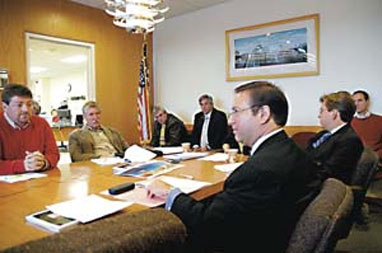
|
Dan Hust | Democrat
CAPPELLI ENTERPRISES EXECUTIVE Vice President Joe Apicella explains the Concord's situation to legislators in Monticello yesterday.
|
Concord seeks aid from Sullivan County
By Dan Hust
MONTICELLO — Cappelli Enterprises’ executive vice president, Joe Apicella, told county legislators yesterday that nothing’s changed with the Concord Hotel project save the design.
That, and the financing is short $20-$30 million.
While he unveiled a new design created by an architectural firm that has designed famed Las Vegas hotels like the Bellagio, Caesar’s, Mirage and Rio, Apicella has run into an obstacle on Wall Street.
“Our underwriters want an additional source of revenue to support more bonds,” he explained during Thursday’s Sullivan County Legislature Community and Economic Development Committee meeting.
Cappelli Enterprises has already secured the bulk of the financing it needs to spend $1 billion rebuilding and rebranding the former Concord in Kiamesha Lake, but the downturn in the credit market has apparently given some of developer Louis Cappelli’s investors cold feet.
So Cappelli is asking the county to “bridge that gap” by promising to give his company millions in room tax revenue that the Concord is expected to generate.
Through the Sullivan County Industrial Development Agency (IDA) – which has been assisting Cappelli in obtaining financing and whose board first heard about this issue on Monday – the county would guarantee that once the Concord is operational, all room taxes above and beyond $1.2 million a year (including those generated by other lodging establishments) would be provided to Cappelli’s Concord Associates development firm.
The promise of those monies would be used in the next few months to bond the remaining $20-$30 million for 40 years, said Apicella, adding that the county would not be on the hook should the Concord default.
Apicella thought a resolution to that effect had already been generated and was awaiting approval, but legislators had yet to see anything in writing.
So he pitched it to legislators based on the projection that the Concord will likely collect $3.5 million a year in room taxes at the current rate.
Noting that the county currently annually receives about $650,000 in room taxes, Apicella also explained that Cappelli would not seek the first $1.2 million collected in room taxes every year. Since room tax revenues are required by state and county law to fund tourism efforts through the Sullivan County Visitors Association (SCVA), the SCVA’s budget would effectively double.
Legislators, however, remained cautious.
“This is more than collateral,” observed Legislator Leni Binder. “This is a dedicated use of money to pay a bond.”
“Yes,” confirmed IDA attorney Walter Garigliano. “This would be the sole source of repayment of these bonds.”
Binder acknowledged that such a public-private deal has been struck elsewhere in the state, but she felt more discussion was warranted – including a cap on how much room tax revenue the Concord would ultimately get.
“I really need some time to see this in writing,” she said, likening it to union negotiations. “I think we need some very private discussions.”
Legislators Jodi Goodman, Frank Armstrong and David Sager agreed that county officials needed to do their homework on such a plan.
Though he agreed with the other legislators that the Concord is a significant part of the county’s future hopes, “I don’t want to see us as a Legislature put over the barrel continuously,” Sager remarked, worrying that more financial requests will be made of the county as the project progresses.
The IDA, which is endorsing the deal, has already contacted NYS Senator John Bonacic and Assemblywoman Aileen Gunther, who are drafting the state legislation needed to allow the county to change its room tax rules.
Legislator Elwin Wood, who chairs the IDA’s board, stated that “we’re not taking any money away from the county in taxes,” nor would the deal hurt the county’s bond rating.
“Is this anyone’s first choice? No,” acknowledged Legislature Chair Jonathan Rouis. “... [But] we’re going to give it serious consideration.”
And in the end, even the most reluctant legislators seemed inclined to agree once the terms are put in writing, if only because the Concord project brings with it the promise of increased sales taxes and property values throughout a struggling area.
“Basically with the economy the way it is,” remarked Wood, “we want the revenue as fast as we can.”



